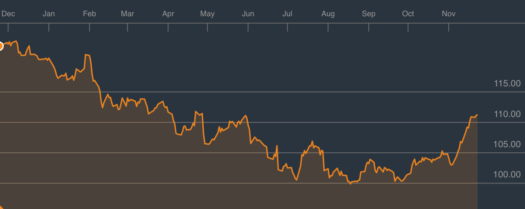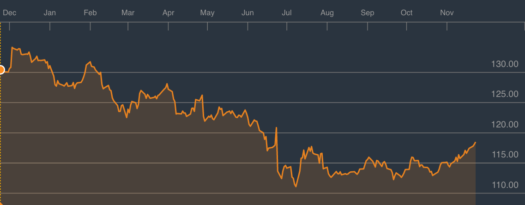Did Kuroda luck out?
Most people will think this post is sour grapes on my part, but I’ve never cared what most people think. I simply offer my honest opinion. I was skeptical of Kuroda’s plan to peg bond yields. (In this post I suggested that it was a positive step, but likely to have only a very small impact.) But as of today the policy seems to be working. The yen has lost about half of the ground gained over the last year. Recall it moved from about 125/dollar a year ago to 100 in late summer. Now it’s plunged to 112.8.
So was I wrong? I still don’t think so; rather I think that Kuroda got lucky. Just after the policy shift, US bond yields started rising, in both real and nominal terms. Rates in some other important countries also started increasing. This made the pegged 0% yield on 10-year JGBs look increasingly unattractive. The yen depreciated. If that change in global debt markets had not occurred, I doubt the policy would have had much impact. Still, give Kuroda credit, as he was right and I was wrong. (The markets were also wrong, and I’m a market monetarist. Hence my incorrect prediction.)
If there’s a silver lining, it’s that I was less wrong than NeoFisherians who think a policy of lowering bond yields is disinflationary (I say never reason from a bond yield). Keynesians who thought the BOJ was out of ammo were also wrong. I always thought they had plenty of ammo, I just saw other tools as being more promising.
I’m not going to totally change my views based on this one data point, but I’ll file it away as one argument in favor of Ben Bernanke’s view of monetary policy. (He’s the one who suggested this idea to Kuroda.)
PS. If Japan were to hold the yen at around this level, then in the long run Japan would have about the same 2% inflation as the US is likely to have. Markets currently don’t think the Japanese will do so, and thus they expect lower inflation in Japan. But it’s entirely up to the Japanese where they want to set the exchange rate, and their inflation rate. That’s a lesson I hope we can all agree on, except Noah Smith.
PPS. Here’s another way of explaining my “lucky” argument. The yen has fallen only slightly against the euro. Europe also got lucky.



